Real estate SEO is the process of optimizing your website to rank higher in search engine results and attract qualified home buyers and sellers.
With nearly 90% of homebuyers starting their property search online, investing in SEO has become essential for real estate professionals.
In this blog, you’ll learn what real estate SEO is, why it matters, how to improve your site’s visibility, and advanced tips for outperforming competitors.
Table of contents
- What is real estate SEO?
- Why real estate SEO services are essential for your business
- 4 pillars of real estate SEO
- Case study: Owen & Co. boosted local SEO with Birdeye Reviews AI
- Effective real estate SEO strategies: 7 tactics that work
- Advanced SEO tips for real estate experts
- How to choose the right real estate SEO company
- SEO practices real estate agents should avoid
- Frequently asked questions on real estate SEO services
- Streamline your real estate SEO strategy with Birdeye
What is real estate SEO?
Real estate SEO is the process of optimizing a real estate website to appear higher in search results when people search for terms like “homes for sale in [city]” or “top real estate agent near me.” It includes on-page, off-page, technical, and local SEO strategies.
Why real estate SEO services are essential for your business
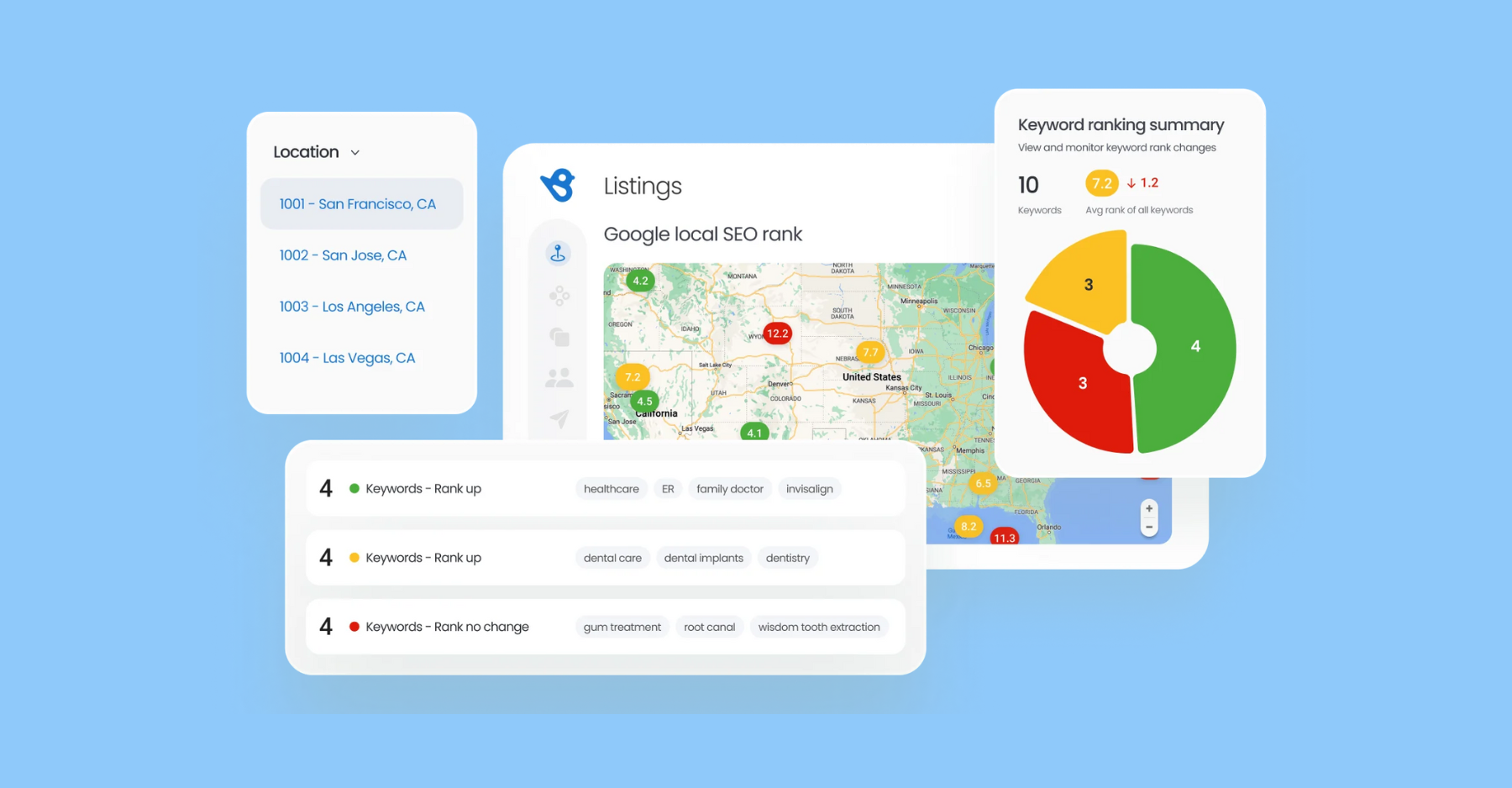
Real estate is a highly competitive space, and your visibility online can make or break your ability to attract new clients. Here’s why investing in SEO is a must for your business growth.
1. Increase website visibility in search results
Most homebuyers and sellers start their search online, often typing queries like “best real estate agents near me” or “homes for sale in [city].” If your website doesn’t appear on the first page of Google, you’re missing out on valuable leads. A strong SEO strategy ensures that your agency ranks higher, making it easier for potential clients to discover your services.
2. Attract more buyers and sellers
People searching for properties or real estate agents online are already interested in making a move. By optimizing your website and property listings—especially with tools like Birdeye Listings AI—you ensure that your properties show up in relevant searches. This means more inquiries from serious buyers and sellers actively seeking opportunities.
3. Boost online presence
Your website is often the first impression potential clients get of your business. With effective real estate SEO, you’re not only improving rankings but also enhancing your credibility. Appearing in top search results for local queries like “real estate agencies near me” make your business look more trustworthy and accessible, increasing the chances of inquiries and appointments.
4. Attract high-quality leads
Unlike paid ads that attract a broad audience, real estate SEO brings in organic leads—people who are specifically looking for what you offer. Whether they’re searching for a realtor, a home valuation, or available listings, an optimized website ensures they land on your page instead of a competitor’s. This means higher conversion rates and more meaningful connections with potential clients.
5. Increase revenue potential
Real estate SEO doesn’t just bring more traffic; it drives tangible results. The more visible your agency is online, the more calls, emails, and property inquiries you’ll receive. Over time, this leads to more closed deals, repeat clients, and referrals, all of which contribute to higher revenue and long-term growth.
6. Outpace local competitors
If your competitors are investing in SEO and you are not, they will outrank you. A well-optimized website helps you secure a top spot in local search results, ensuring potential clients see your listings first.
The bottom line? Real estate SEO drives long-term visibility, brings in qualified leads, and sets you up for sustainable growth, without relying on paid ads alone.
4 pillars of real estate SEO
Effective real estate SEO goes beyond adding keywords to your homepage. To consistently rank higher in search results, your strategy should cover these four key areas:
1. On-page SEO
On-page SEO refers to everything you can optimize directly on your website, including content, keywords, headings, metadata, and internal linking. Here’s what you can focus on:
- Title tags & meta descriptions: Crafting compelling title tags and meta descriptions helps search engines understand your page content while enticing users to click. Use relevant SEO keywords related to real estate SEO, like “Luxury Homes in [City Name]” or “Affordable Apartments in [Neighborhood].”
- URLs: Clean and descriptive URLs (e.g., www.yourwebsite.com/2-bedroom-apartment-nyc) make it easier for search engines to crawl and index your search engine results pages.
- Content optimization: Well-written, keyword-optimized property descriptions, blog posts, and neighborhood guides will help your site rank for long-tail keywords (e.g., “buy a home in [City]” or “sell your property in [Neighborhood]”).
- Images and alt text: High-quality images are essential for real estate SEO listings, but it’s also crucial to add relevant alt text to help search engines understand the content of your images.
On-page optimization makes your website more accessible and understandable to both users and search engines, improving your chances of ranking for relevant real estate SEO searches.
2. Off-page SEO
Off-page SEO focuses on strategies you can use outside of your website to increase brand awareness and improve rankings. Here’s what it involves:
- Link building: Acquiring high-quality backlinks from authoritative sources, such as other real estate websites, local business directories, or media outlets, signals to Google that your site is credible and relevant.
- Social media marketing: Engaging with users on social media platforms like Instagram, Facebook, and LinkedIn helps build your branding services and also drives organic traffic to your site. Shares and mentions on social platforms can increase your website’s exposure.
- Guest posting: Writing guest blog posts for well-known real estate websites or industry publications allows you to build local backlinks, improve your reputation, build your brand presence, and increase your visibility among potential clients.
Off-page SEO efforts are about building trust and credibility, which play a huge role in improving your site’s high search volume, ranking, and visibility.
3. Technical SEO
Technical SEO deals with the behind-the-scenes elements of your real estate website that affect its performance and search engine ranking. This type of SEO focuses on improving the structure, speed, and accessibility of your website, ensuring a smooth user experience for visitors. Here’s what to prioritize:
- Site speed: Fast loading times are essential for both user experience and real estate SEO experts. Slow websites are penalized by other search engines, leading to higher bounce rates. Compressing images, allowing browser caching, and minimizing unrequired code can speed up your site.
- Mobile-friendliness: With most property searches taking place on mobile devices, having a mobile-responsive website is non-negotiable. Ensure your real estate website adapts seamlessly across smartphones and tablets.
- Secure website (HTTPS): Search engines prioritize websites with SSL certificates, marking them as secure. Having HTTPS ensures your visitors feel safe browsing your site, positively affecting SEO.
- Site architecture: A well-organized website with clear navigation and logical internal linking helps search engines crawl and index your pages efficiently.
Technical optimization ensures that search engines can properly access, crawl, and rank your website, making it crucial for SEO success and user satisfaction.
4. Local SEO
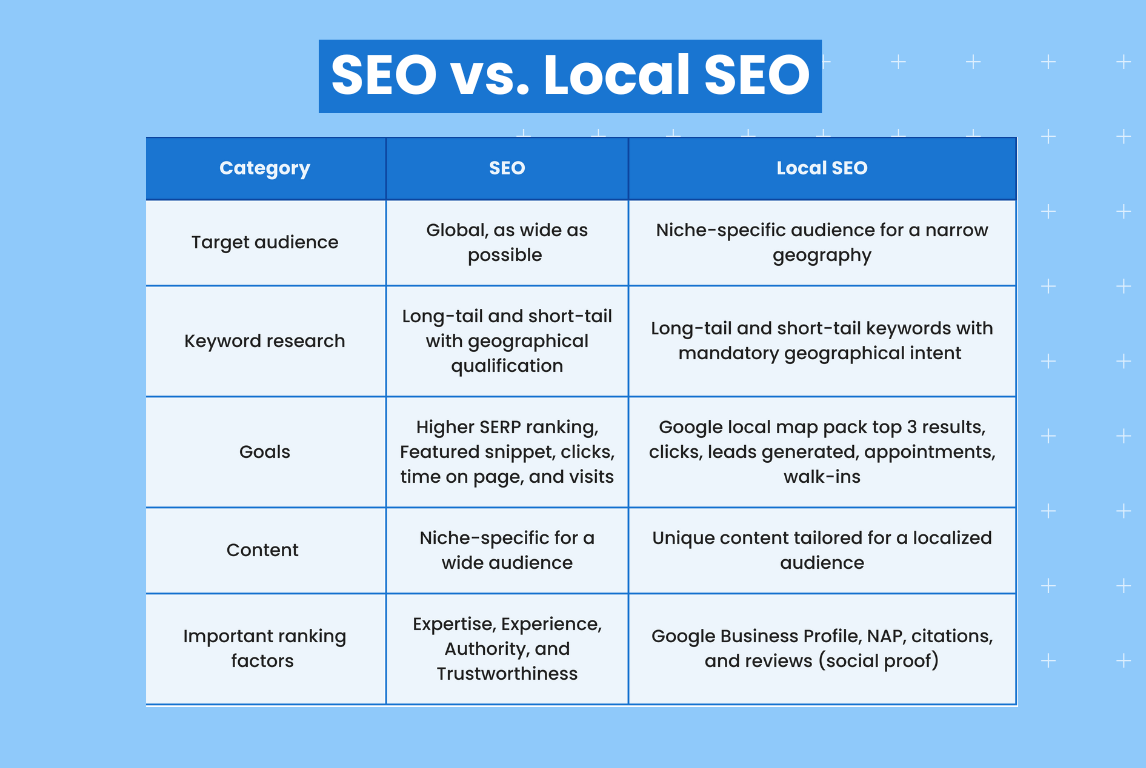
Local SEO is the foundation of success for real estate businesses targeting specific geographic areas. Key actions include:
- Optimizing your Google Business Profile with accurate business info, categories, and photos
- Collecting and responding to customer reviews, which signal trust and relevance
- Building local citations (mentions of your business on other websites) with consistent name, address, and phone number (NAP) info
Local SEO helps your agency appear in the “map pack” results and on location-based searches like “realtors near me” or “homes for sale in [city].”
Here’s how you can improve your real estate SEO with local optimization strategies:
1. Google Business Profile optimization
Claiming and optimizing your Google Business Profile ensures that your business appears in local search results, Google Maps, and the local pack. Make sure your address, phone number, and hours of operation are accurate and up-to-date.
2. Localized content
Creating quality content relevant to specific neighborhoods, cities, or regions helps you rank for searches like “real estate SEO company in [City Name]” or “homes for sale near [Neighborhood].” This can include neighborhood guides, local market analysis, or spotlight articles on specific communities.
3. Local reviews and ratings
Encourage clients to leave reviews on Google, Yelp, or other industry-specific platforms like Zillow or Realtor.com. Positive reviews not only build trust but also help improve local SEO rankings.
4. Local citations
Ensure your business is listed on local directories and real estate SEO platforms. Consistency across your business name, address, and phone number (NAP) on various sites enhances your local SEO for real estate.
Refining on-page, off-page, technical, and local SEO can enhance your real estate website’s rankings, increase visibility, and drive more qualified leads.
Case study: Owen & Co. boosted local SEO with Birdeye Reviews AI
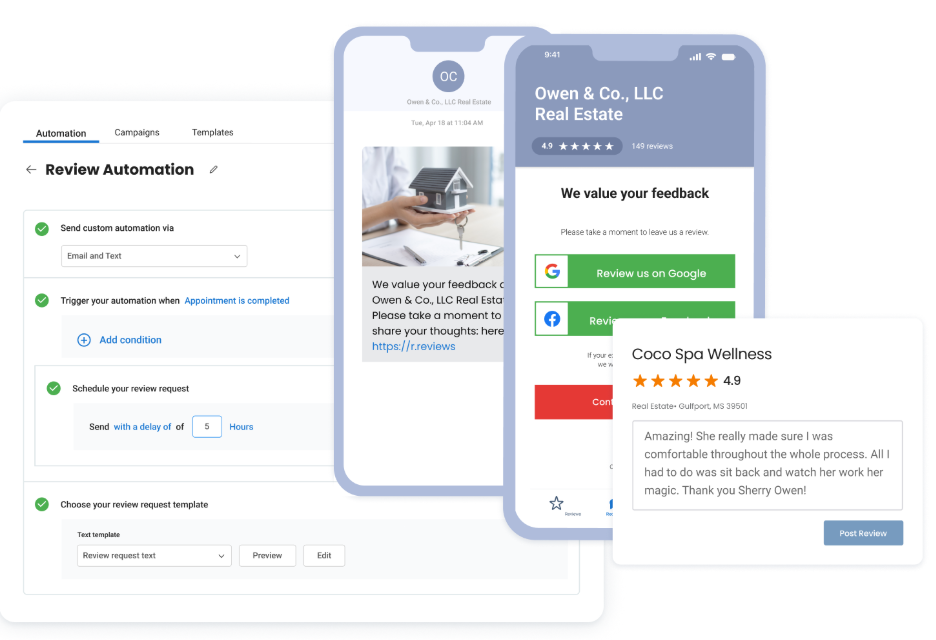
Owen & Co., LLC automated its review collection using Birdeye Reviews AI saw a significant increase in review volume, and raised its average rating to 4.8 stars. This led to more real estate website traffic and better local search rankings, helping it stand out to potential clients.
The above success story proves that by gathering and promoting positive reviews, real estate SEO experts can improve their local SEO optimization and generate more leads for their real estate businesses.
Local SEO makes your real estate firm visible when potential clients are specifically searching for properties or services in your local area, which increases the likelihood of attracting high-quality, local leads.
Effective real estate SEO strategies: 7 tactics that work
Implementing real estate SEO strategies is key to improving your rankings and driving traffic. Here are seven proven ways to boost your search rankings and generate more leads:
1. Optimize your website’s speed
Website speed is crucial for both user experience and SEO. A slow-loading site can lead to higher bounce rates and lower search engine rankings. To improve speed, compress large images to reduce file size without compromising visual quality. Regularly check for broken links and ensure your site has HTTPS security to enhance trust and SEO performance. These small adjustments contribute to faster page load times, affecting user satisfaction and search rankings.
2. Use local long-tail keywords
Targeting the relevant keywords is essential for driving local traffic to your real estate website. Long-tail keywords, which are more specific and less competitive, often have higher intent and are used by people ready to decide.
For example, instead of targeting a broad term like “real estate,” focus on relevant keywords like “3-bedroom homes for sale in [City Name].” These localized keywords make it easier to rank in search results and attract more leads looking for properties in your area.
3. Create valuable and relevant content
Quality content is essential for engaging your audience and improving SEO. By providing useful information, such as local market trends, buying tips, or neighborhood guides, you position yourself as a trusted authority.
Ensure your content is well-written, naturally integrates keywords, and addresses the common questions your audience may have. Well-structured blog posts with headings, images, and internal links help search engines understand your content, boosting your visibility and rankings.
4. Ensure your website is mobile-friendly
Since more than half of web traffic comes from mobile devices, having a mobile-friendly website is a necessity today. A mobile-optimized site ensures a smooth user experience, which can lead to longer visits and better engagement.
Search engines, like Google, prioritize mobile-friendly sites for ranking, meaning that if your site doesn’t display properly on mobile, it may be penalized in search results. Use mobile-friendly design principles and regularly test your site’s mobile usability to keep up with the increasing use of smartphones for browsing.
5. Share updates on social media
Social media is an effective tool for increasing your online presence and driving traffic to your website. While backlinks from social media don’t directly improve SEO, they help you connect with potential clients and build brand recognition. Sharing valuable tips, property updates, and local market news on platforms like Facebook, Instagram, and LinkedIn can engage your audience and attract followers who may later link to your site or refer you to others. Be active in discussions and provide valuable insights to position yourself as an expert in your field.
6. Monitor important SEO metrics
Tracking your SEO performance is key to understanding what’s working and where you need to improve. Monitor key metrics like organic traffic, keyword rankings, click-through rates, and conversion rates to measure your site’s success. Tools like Google Analytics or other SEO platforms can provide detailed insights into how users interact with your site and which strategies deliver results. By tracking these metrics, you can make data-driven decisions to optimize your content and improve your SEO efforts over time.
7. Set up a Google Business Profile and local listings
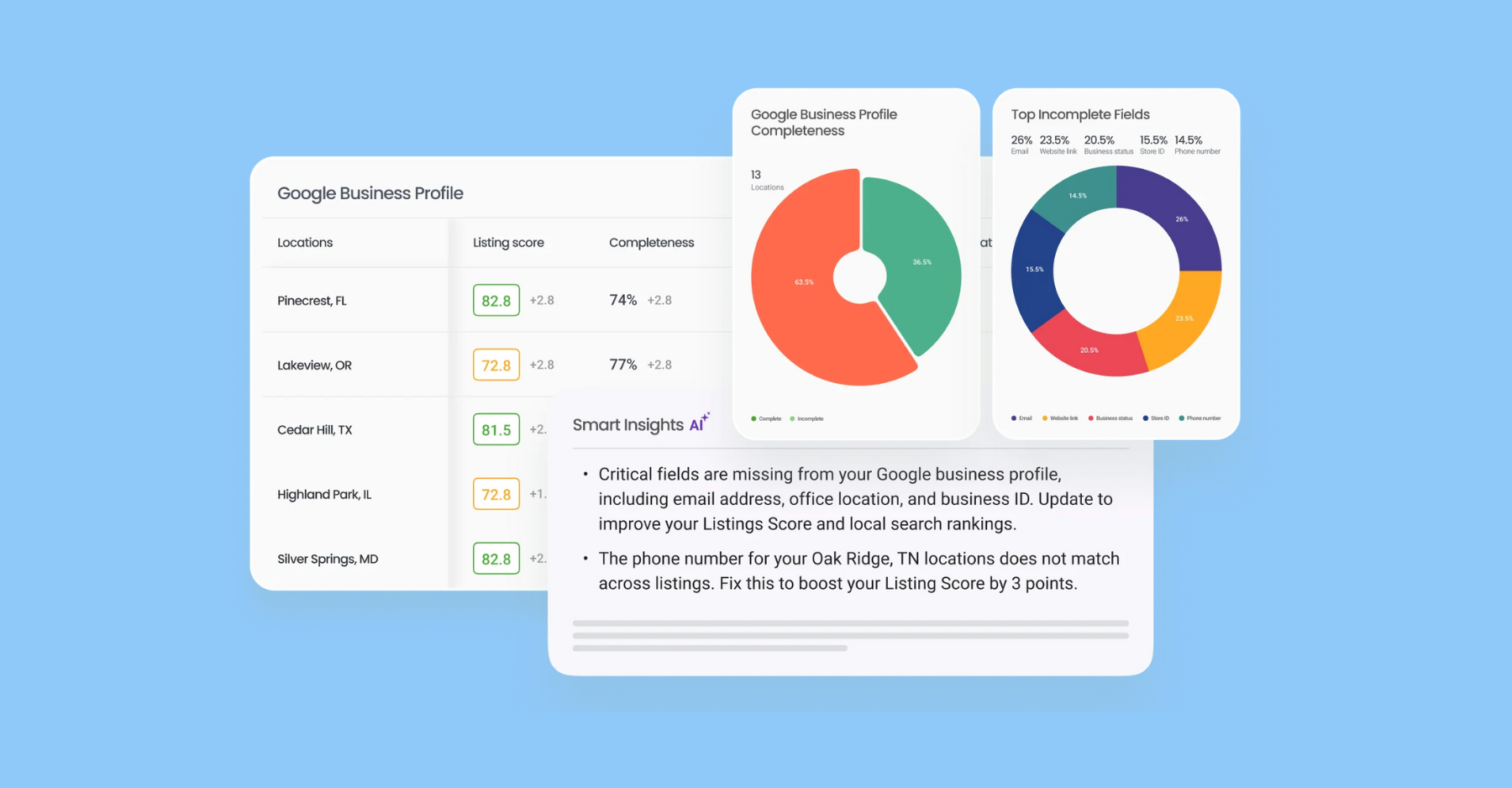
Set up a Google Business Profile and local listings through platforms like Birdeye Listings AI to enhance your visibility in local searches, making it easier for potential clients to find your real estate services and trust your business. Encourage satisfied clients to leave reviews, as positive feedback increases your credibility and can influence your ranking in local search results.
Applying these tips and leveraging Birdeye’s Gen AI tools can improve the performance of your real estate SEO agency and help real estate SEO experts.
Advanced SEO tips for real estate experts
In addition to basic practices, SEO services for real estate agents can enhance their online visibility and drive more qualified leads by implementing advanced strategies. Here’s how real estate agent SEO can make a difference:
1. Implement schema markup for listings
Structured data (schema markup) helps search engines understand and display your listings more effectively, often with enhanced search results like images, prices, and open house dates.
For example, add schema tags to your property listings for fields like “price,” “address,” “number of rooms,” and “availability.” This can help your listings stand out in search with rich snippets.
2. Use video content for listings and neighborhoods
Integrating video tours of properties and neighborhood guides provides engaging content for potential buyers and improves dwell time on your site, which search engines reward.
3. Optimize for “Near me” and voice search
As voice search and mobile queries grow, optimize your content for conversational keywords like “best realtor near me” or “who’s selling homes in [neighborhood].”
Include FAQs or headers that mirror how someone might speak—e.g., “Where can I find affordable homes near downtown Phoenix?”
4. Build Topic Clusters to Improve Authority
Google rewards sites that organize content around clear themes. A topic cluster strategy links multiple pages around a central topic to strengthen SEO for that theme.
For example, create a central guide on “Moving to San Diego” and link to related blogs like “Best Neighborhoods in San Diego,” “Cost of Living in San Diego,” and “First-Time Homebuyer Tips.
How to choose the right real estate SEO company
Selecting the right real estate SEO company is a crucial decision for the success of your business. With so many agencies offering similar services, it can be overwhelming to choose the best fit. To make this process easier and ensure that you choose a partner who will align with your goals, consider the following key factors before making your choice.
1. Key considerations when selecting an SEO partner
When evaluating potential real estate SEO companies, it’s important to think beyond just pricing and consider the factors contributing to a long-term, successful partnership. Here are the main aspects to keep in mind:
2. Experience in real estate SEO
Look for an SEO company with proven experience in the real estate sector. An agency familiar with real estate businesses understands the industry’s unique challenges, from optimizing property listings to local search strategies. They’ll have a successful track record and the expertise to address your business’s specific needs. Be sure to ask for examples of previous work to assess their knowledge and approach. Platforms like Birdeye can help you track and optimize your local SEO efforts, ensuring you’re targeting the right audience.
3. Expertise in SEO techniques
SEO constantly evolves, and your chosen agency should stay ahead of the latest trends and updates. Expert SEO specialists are crucial to ensure that your website adheres to the best practices and Google’s algorithm requirements. Make sure the agency offers a comprehensive approach, including on-page, off-page, technical, and local SEO, as each area is vital for boosting your real estate site’s performance.
4. Tailored SEO strategies
Every real estate business is different, so one-size-fits-all solutions don’t work. A good SEO company will customize its approach based on your specific goals. Whether you’re targeting a local audience, trying to rank for competitive keywords, or focusing on improving user engagement, they should develop a cost-effective marketing strategy that directly addresses your unique challenges and objectives.
5. Clear and consistent communication
Effective communication is the backbone of a strong partnership. You want an agency that regularly updates your SEO performance and progress. They should inform you about their strategies, what’s working, and any changes needed to enhance your results. This ensures you’re always in the loop and your goals are actively pursued.
6. Demonstrated results
A reputable SEO company will have case studies or portfolios showcasing their success in the real estate sector. Look for evidence of improved rankings, increased traffic, and more leads. Client testimonials and feedback can offer insight into the company’s effectiveness. A well-established company like Birdeye, which works with various businesses, can provide concrete examples of how their tools drive real results.
By considering these factors; experience, expertise, tailored strategies, communication, and proven results, you’ll be well-equipped to choose a real estate SEO company that meets your needs and helps you achieve your long-term real estate marketing goals.
Optimize Listings with Real Estate SEO Today!
Want to see the impact of Birdeye on your business? Watch the Free Demo Now.
SEO practices real estate agents should avoid
While real estate services are essential to growing your real estate business, not all marketing tactics are beneficial. In fact, some common practices can harm your rankings and online reputation. Here are SEO tactics that real estate agents should avoid:
1. Keyword stuffing
First, keyword stuffing, or overloading content with excessive keywords, can result in poor rankings. Search engines prioritize natural, valuable content over attempts to manipulate rankings. Instead, agents should focus on providing high-quality, engaging content that offers real value to users.
2. Buying backlinks
Buying backlinks is another harmful practice. Purchasing backlinks from low-quality sources or participating in link farms can lead to penalties from Google. Earning organic backlinks through valuable content creation and networking is better than relying on questionable tactics.
3. Duplicate content creation
Duplicate content is also detrimental to SEO. Using the same content across multiple search engine results pages or copying material from other websites confuses search engine algorithms, negatively impacting rankings. Ensuring that every piece of content on a real estate website is unique, including property descriptions and blog posts, is essential for success.
4. Ignoring mobile optimization
Another common mistake is neglecting mobile optimization. Given that many real estate business searches occur on smartphones, it’s crucial that a website is mobile-friendly. Google prioritizes mobile-optimized websites in search rankings, so ensuring that a site is responsive and easy to navigate on mobile devices is necessary.
5. Neglecting local SEO
Failing to focus on local SEO can result in missed opportunities. Agents should prioritize location-specific keywords and optimize their Google Business Profile to boost visibility in local search results. This is especially important in the real estate business, where local targeting is key to attracting clients.
6. Ignoring analytics and SEO audits
Finally, neglecting to use analytics and performing regular SEO audits can prevent agents from identifying areas that need improvement. Monitoring site performance through analytics tools and staying informed about the latest trends and changes in search engine algorithms is essential for maintaining a strong SEO strategy.
Keeping these real estate SEO tips in mind will help in creating a real estate SEO-friendly website with high-quality content creation.
Frequently asked questions on real estate SEO services
A dedicated marketing team within your company manages in-house SEO, while an SEO agency is an external firm specializing in real estate services.
SEO in property refers to optimizing real estate websites and listings to improve visibility on search engines and attract potential buyers or sellers.
Paid real estate SEO can be worth it if you need immediate results and targeted traffic, but it should complement long-term organic real estate SEO efforts.
Yes, you can perform real estate search engine optimization without paying by using free tools and focusing on strategies like keyword optimization, high-quality content, and building backlinks.
Streamline your real estate SEO strategy with Birdeye
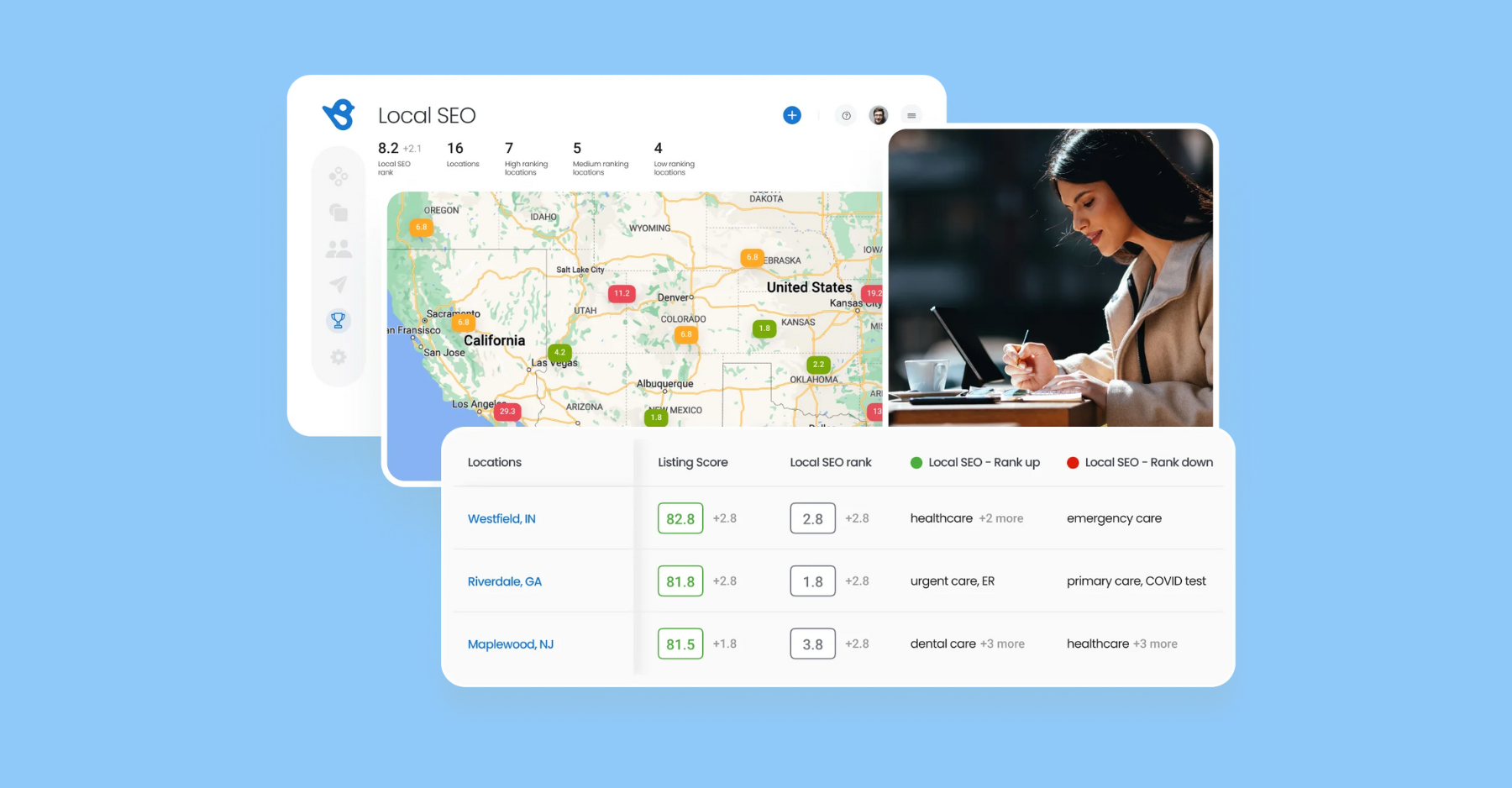
Optimizing your real estate SEO doesn’t have to be complicated. Birdeye’s advanced GenAI solutions help real estate agencies improve their local search rankings, attract more clients, and easily maintain a strong online presence. Here’s how:
- GBP optimization: Birdeye helps you claim and optimize your Google Business Profile, ensuring your agency appears in local search results and Google Maps. With AI-powered insights, you can enhance your mobile engagement and make it easier for potential buyers and sellers to find you.
- Local listing management: The key to real estate SEO success is keeping your business details accurate and consistent across platforms like Google, Yelp, Zillow, and Realtor.com. Birdeye automates this process, ensuring your agency’s NAP is updated across all major directories and improving visibility and credibility.
- Review management: Birdeye Review AI makes it simple to collect, manage, and respond to customer reviews, helping you build a strong reputation while boosting your real estate SEO rankings.
- Local SEO analytics: With Birdeye’s local SEO Analytics, you can track key metrics, identify areas for improvement, and attract more qualified leads with data-driven insights.
With Birdeye, you can streamline your SEO efforts, improve your local search presence, and connect with more potential clients—all while saving time and effort.
Ready to dominate local search results and grow your real estate agency? Watch a free demo today.

Originally published









